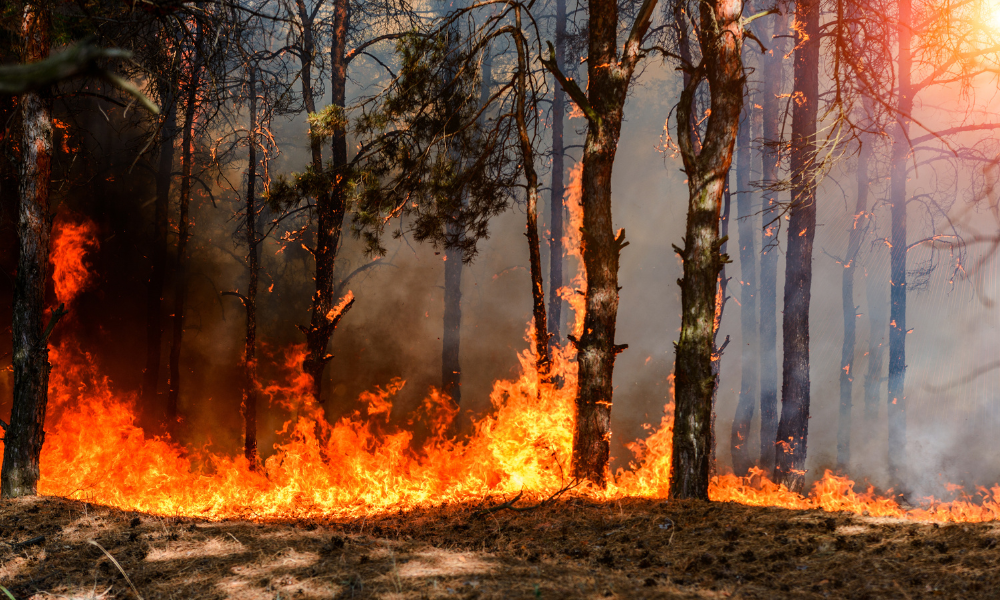KPMG LLP’s new survey revealed that 91 percent of Canadians were worried about a possible urban climate disaster affecting the operations of their organisations following the wildfires impacting Los Angeles County, US, and amid Canada’s own wildfire season.
“As wildfires rip through parts of Manitoba and northwestern Ontario, and after what we witnessed in L.A., it no longer matters where you live – whether it’s in Canada’s remote boreal forest or in the middle of a major city – the growing intensity and frequency of extreme weather events makes everyone vulnerable,” said Roopa Davé, a Vancouver-based partner and national climate risk leader of KPMG in Canada, in a media release.
“It was heartbreaking to see wildfires across our country two summers ago destroy a total area larger than England, and we all remember the tragedies that unfolded in Jasper, Lytton, Fort McMurray, and Slave Lake, but the large-scale catastrophic destruction in L.A. – the most-populous county in the U.S. with nearly 10 million people – left everyone shaken,” Davé added in KPMG’s media release.
Recent research by KPMG in Canada showed that, among 351 Canadian business leaders and owners surveyed:
- 93 percent were concerned that extreme weather would affect their companies this year
- 90 percent said their expectations that extreme weather “could – and will – happen at any time” influenced their plans
- 68 percent were getting ready for a climate-related weather calamity
Among those polled, 68 percent recorded reductions in their profits. Specifically:
- 18 percent saw reductions of five percent or under
- 30 percent experienced 6–10 percent reductions
- 14 percent noted 11–25 percent reductions
- Six percent suffered reductions of over 25 percent
KPMG’s research also covered the effects of extreme weather events on small businesses in 2024. Among those surveyed:
- 65 percent saw direct impacts to their business operations, such as losses in power, water supply, utilities, or communications
- 60 percent shared that their staff suffered direct impacts, such as decreased productivity
- 52 percent experienced disrupted supply chains
- 47 percent reported significant cost increases
- 43 percent suffered damages to their locations, such as stores and factories
Emergency preparedness
“We now see business leaders actively take steps to protect their companies and employees, ranging from updating continuity plans and crisis management protocols to adopting climate-modelling data analysis and tools, retrofitting buildings, investing in renewable energy sources and educating employees on better preparedness and response,” Davé said in the media release.
KPMG shared that, among those polled:
- 93 percent reported investments in climate-related risk and adaptation preparedness
- 68 percent said recession expectations due to the global trade war initiated by the US compelled them to reduce such investments
- 78 percent invested in data, analytics, and technology solutions seeking to identify, monitor, or mitigate climate risks
- 53 percent invested in infrastructure adjustments to address extreme weather
- 56 percent worked with climate authorities to prepare for long-term climate shifts
- 62 percent conducted climate risk assessments to identify possible calamities
- 66 percent planned to perform climate risk assessments in the next two years
- 67 percent said extreme weather in 2024 drove the development of emergency plans
- 62 percent formed emergency response planning teams in the last 12 months
“Whether disaster strikes in remote areas or in urban centres, companies and governments must continuously evaluate and update emergency planning and procedures to incorporate lessons learned and best practices,” said Leon Gaber, a Victoria-based partner and national lead for KPMG in Canada’s critical infrastructure resilience and emergency management practice, in the media release.
“By using data and advanced technologies such as artificial intelligence, remote sensors, drones and digital twins, companies can enhance their ability to forecast climate-related events, assess their effects on operations, and respond faster and more effectively,” Gaber added in the media release.
“Climate events should no longer be considered a force majeure, and appropriate plans should be in place to effectively respond to an emergency and recover from it,” said Doron Telem – partner and National ESG Leader for KPMG in Canada, based in Toronto – in the media release.
“Best practices would include a scenario analysis for specific weather events, tabletop exercises to simulate emergency protocols, and implementation of recurring training to account for changing conditions over time,” Telem added in KPMG’s media release.
KPMG also asked small businesses about their insurance plans. Among those surveyed:
- 63 percent obtained insurance for certain weather impacts, but planned to add to their coverage
- 61 percent were developing comprehensive weather impact insurance reviews
- 31 percent cancelled their insurance because of climate or extreme weather risks
- 32 percent lacked insurance covering severe weather impacts due to high prices





